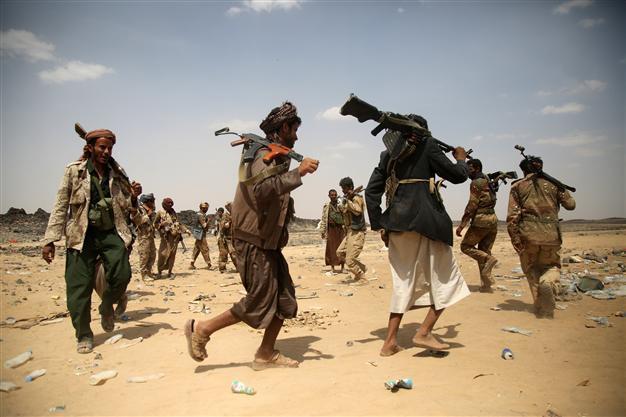Officials: Yemen rebels release 6 foreign hostages
SANAA, Yemen - The Associated Press

Armed Yemeni tribesmen from the Popular Resistance Committees, supporting forces loyal to Yemen's Saudi-backed fugitive President Abedrabbo Mansour Hadi, hold a position in Marib province, east of the capital, Sanaa on September 18, 2015. AFP Photo
Yemen's Shiite Houthi rebels have released six foreigners whom they were holding hostage and they are flying out of the country's capital Sanaa, airport officials and Houthi officials said on Sept.20.The airport and Houthi officials, speaking on condition of anonymity because they were not authorized to speak to reporters, said the six are flying to the Gulf nation of Oman, which negotiated their release.
The officials said the hostages, who were detained earlier this year, are three Americans, two Saudis and a British national. The identities of the hostages were not immediately known.
Officials from the Houthi media center refused explain why they had detained the hostages. But at least one of them is a journalist, whom they said "entered the country illegally" and "worked without notifying the authorities."
A Houthi delegation left with the hostages to go to Oman, where they will resume talks with the U.N. envoy to Yemen, Ismail Ould Cheikh Ahmed, the Houthi officials said. A Houthi statement came out shortly after confirming the delegation's visit to Oman.
Meanwhile, Houthi spokesman Mohammed Abdel Salam held a press conference at the airport and refused to confirm the hostages' release.
"If we were to release anyone, it would be in exchange for the release of Houthis," he said, without specifying which authorities he was addressing.
The conflicting information could not immediately be reconciled.
The U.S. Embassy in Muscat and the British Foreign Office were unable to immediately confirm the hostages' release. Omani officials could not be immediately reached for comment.
In June, American freelance journalist Casey Coombs, who was held by the rebels, was set free. Following Coombs' release, which Oman mediated, State Department spokeswoman Marie Harf said they were working to win the release of several Americans detained in Yemen.
Last month, the United Arab Emirates helped free British petroleum engineer Robert Douglas Semple, who had been held for 18 months after being kidnapped by al-Qaida in Yemen, which has expanded its reach in the country amid the fighting between Houthis and their opponents.
Yemen has been torn by a ferocious war pitting the Houthis and forces fighting for former President Ali Abdullah Saleh against fighters loyal to exiled President Abed Rabbo Mansour Hadi, as well as southern separatists, local militias and Sunni extremists. The conflict escalated in March as a Saudi-led, U.S.-backed coalition launched airstrikes against the Houthis.
Also Sept.20, Saudi Brig. Gen. Ahmed al-Asiri told al-Sharq al-Awsat, a daily owned by King Salman's family, that "coalition forces never targeted the home of Oman's ambassador in Sanaa."
A day earlier, Oman's foreign ministry said the home, which was attacked on Sept.18, was targeted without giving any details on the incident or assigning blame. The attack, they said, was "a clear violation of the charters and international norms that emphasize the inviolability of diplomatic premises."
Meanwhile in the western province of Ibb, the Saudi-led coalition's airstrikes against a Houthi stronghold and prison facility killed 11 and wounded more than 50 rebels and civilians, security officials and witnesses said.
Sunday's airstrikes hit a security directorate where the rebels held more than 300 prisoners underground, said the officials, who remain neutral in the conflict that has splintered the country's security forces.
Many managed to escape, but dozens remain buried under the rubble, they added. Many of the confirmed dead, witnesses said, were onlookers who had gathered around the building following the first strike, only to be hit by the second.
All officials and witnesses spoke on condition of anonymity because they are not authorized to brief reporters.
















